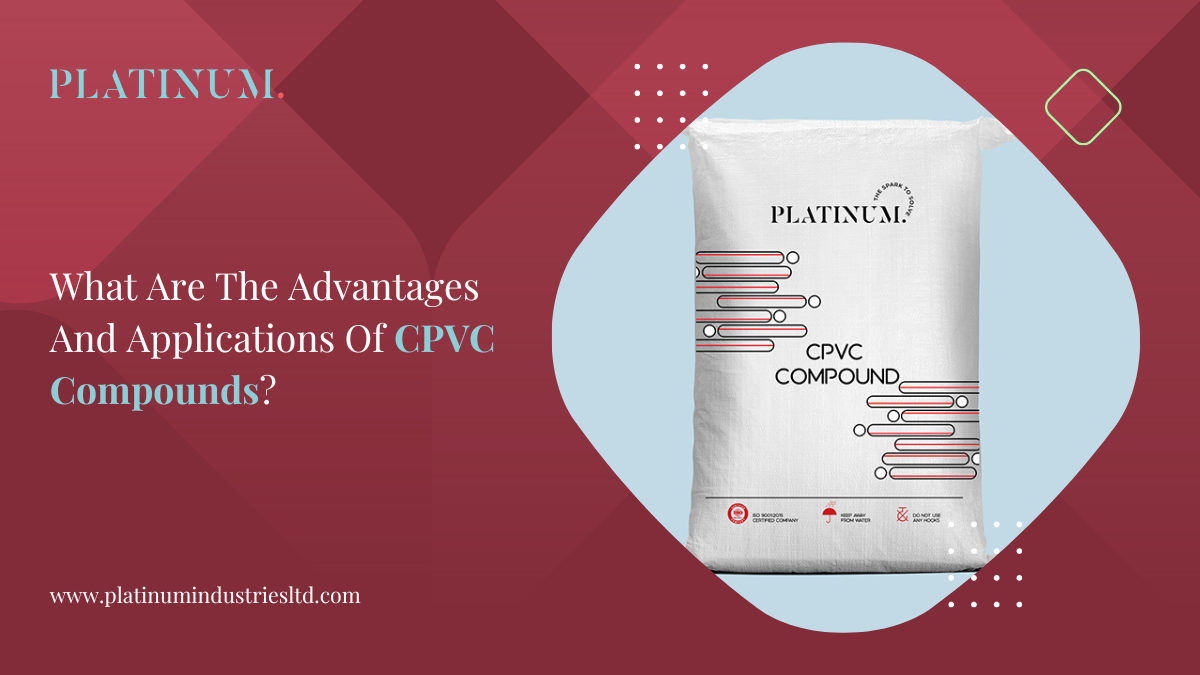Chlorinated Polyvinyl Chloride (CPVC) is a versatile thermoplastic material that has gained significant popularity in various industries due to its unique properties and wide range of applications. CPVC compounds are created by modifying PVC with chlorine, resulting in a material that offers enhanced characteristics.
In this blog, we will explore the advantages of CPVC compounds and delve into their diverse applications across different sectors.
Advantages of CPVC Compounds:
1. High Temperature Resistance:
One of the primary advantages of CPVC compound formulation is their exceptional heat resistance. Unlike traditional PVC, which has a maximum working temperature of around 140°F (60°C), CPVC can withstand temperatures up to 200°F (93°C) or higher, making it suitable for hot water plumbing and industrial applications where elevated temperatures are prevalent.
2. Chemical Resistance:
CPVC compounds exhibit excellent resistance to a wide range of chemicals, acids, and bases. This attribute makes them ideal for use in corrosive environments, such as chemical processing plants, where exposure to various chemicals is common.
3. Fire Retardant Properties:
CPVC compounds are inherently flame retardant, meaning they have a high resistance to combustion and produce minimal smoke and toxic gases when exposed to fire. This makes them suitable for fire sprinkler systems, electrical conduits, and other applications where fire safety is a critical concern.
4. Mechanical Strength:
CPVC compounds possess good mechanical strength and dimensional stability. They can endure high pressures and offer excellent impact resistance, making them a reliable choice for industrial piping, fittings, and other structural components.
5. Low Thermal Conductivity:
CPVC’s low thermal conductivity makes it an effective insulating material. It helps maintain consistent temperatures in hot water plumbing systems, reducing energy losses and promoting energy efficiency.
Applications of CPVC Compounds:
1. Plumbing Systems:
CPVC superpacks are widely used in residential, commercial, and industrial plumbing systems. Their thermal and chemical resistance makes them suitable for pipes, fittings, and valves in both hot and cold water supply lines.
2. Fire Sprinkler Systems:
The fire-retardant nature of CPVC compounds makes them an ideal material for fire sprinkler piping systems. They are commonly used in commercial buildings, warehouses, and industrial facilities to ensure quick and effective fire suppression.
3. Industrial Processing:
CPVC compounds find extensive applications in the chemical processing industry due to their exceptional chemical resistance, such as chemical storage tanks, pipes, and fittings to handle aggressive chemicals safely.
4. Electrical Conduit:
CPVC compounds serve as a reliable material for electrical conduits, offering good insulation and fire resistance. They are used in wiring applications to protect electrical cables and promote safety.
5. HVAC Systems:
CPVC compounds are utilized in heating, ventilation, and air conditioning (HVAC) systems, including cooling towers and heat exchangers, where they can withstand high temperatures and offer corrosion resistance.
CPVC compounds have proven to be an excellent choice for a wide range of applications, thanks to their unique combination of properties. And when it comes to making an excellent choice for buying CPVC compounds, no other name stands out as brightly as Platinum Industries, the leading CPVC compound manufacturer. With a leading R&D lab and a high-quality manufacturing process, Platinum provides some of the top-grade CPVC compounds in the market. Connect with us to know more!
ALSO, YOU CAN READ OUR NEW UPDATES
- 5 Reasons Why You Should Switch To The Organic-Based Stabilizers
- What is Zinc Stearate? Learn About its Applications Here
- How To Choose Cpvc Additives? Here Are The Tips To Keep In Mind
- How do PVC Stabilizers Differ from CPVC Stabilizers? Check out 5 key Differences
- 5 Applications of Calcium Zinc Stabilizer That You Should Know of
- Looking to procure pe wax? Here are the properties you should look for
- 5 applications of cpvc additives that you must know about
- 5 reasons why pvc superpacks are in great demand
- Unlocking the versatility of zinc stearate: exploring its wide range of applications
- Calcium zinc stabilizer: what are its properties and advantages?
- Looking to buy pvc one pack stabiliser? Avoid making these mistakes
- A comprehensive guide on magnesium stearate: learn about its significance and applications
- Check out this guide on 6 pvc stabilizer applications that you didn’t know about
- Calcium stearates: what are the different types and applications?

